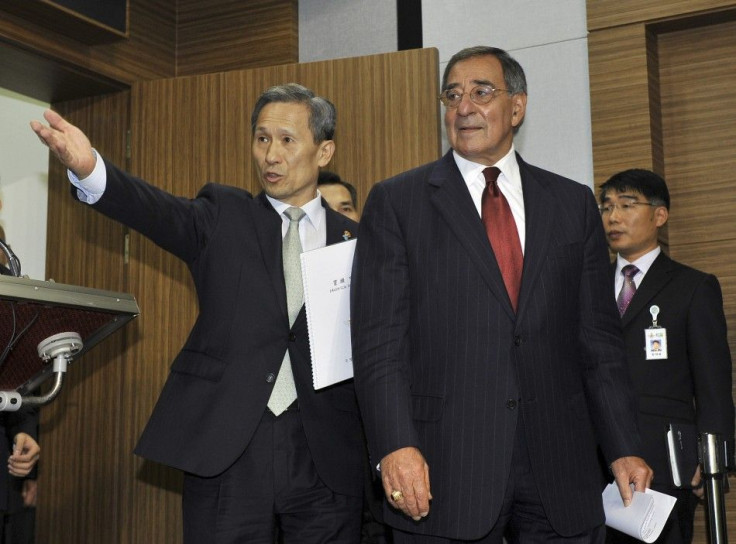North Korea Remains 'Serious Threat': Leon Panetta

The United States has pledged to deepen its security and military ties with South Korea, while maintaining a watchful and suspicious eye towards North Korea.
The U.S. Secretary of Defense Leon Panetta, on an official state visit Seoul, and his South Korean counterpart, Kim Kwan-jin, have vowed to respond forcefully to any aggressive acts by North Korea.
[The Seoul-US alliance] will display our strong willingness to strike back if North Korea carries out provocations and to stage effective joint response not only in the case of an all-out war but of provocations, said Kwan-jin.
“[We] will jointly deter any additional provocations by North Korea.”
Panetta warned that North Korea remains a serious threat and that Seoul and Washington will counteract any hostile moves by Pyongyang.
Indeed, last year, Seoul blamed North Korea for launching two deadly attacks that killed a total of fifty people. In the first incident, North Korea allegedly sank a South Korean warship located near the disputed maritime border, killing 46 South Korean sailors. In November, North Korea shelled an island near the border that killed four more South Koreans.
North Korea has denied direct responsibility for the deaths.
Nonetheless, Panetta said the U.S. and South Korea will offer strong and effective responses to those kinds of provocations if we work together and develop the kind of coordinated response that we think is necessary.
Panetta also noted that despite cuts in the U.S. defense budget back in Washington, the American military presence in South Korea -- which comprises some 28,500 troops – would remain unchanged.
Meanwhile, U.S. officials are scrambling to negotiate for the end of North Korea’s nuclear program. Last week, officials from both nations met in Geneva, Switzerland to mutually discuss this difficult topic.
As long as six years ago, Pyongyang agreed to relinquish its nuclear program in exchange for some political and economic concessions from the West and South Korea. These nuclear talks also included Russia, China and Japan, as well as the U.S.
However, these negotiations collapsed in 2009 right after North Korea conducted its second nuclear test.
Panetta sounded pessimistic about the chances for agreement with the North Koreans.
We're not sure where those talks are headed at this point... For that reason, I guess the word 'skepticism' would be in order, he told reporters Thursday.
“There is a history here of accommodation and provocation. And there are periods when we are hopeful that we might be able to achieve some diplomatic progress in eliminating their nuclear program. And then, for whatever reason, we’re not successful, and suddenly we enter a period of provocation in which they take steps that threatens not only the security of [South] Korea but threaten the security of the United States.”
The New York Times reported that, according to US military officials in Seoul, North Korea is still developing nuclear weapons. The former Defense Secretary Robert Gates, warned earlier this year that North Korea could have the capability to launch intercontinental ballistic missiles at the U.S. within five years.
Earlier in the week, South Korea’s president, Lee Myung-bak, implored China to pressure North Korea into ending its nuclear program.
“I wish China to continue to play an important role for the denuclearization of the Korean Peninsula and the reforming and opening of North Korea,” Lee told Li Keqiang, the vice prime minister from China who was visiting Seoul, according to a statement.
“The frequent exchange of visits between North Korean and Chinese leaders is good, in that North Korea can learn from the success story of China’s reform and opening.”
© Copyright IBTimes 2024. All rights reserved.





















